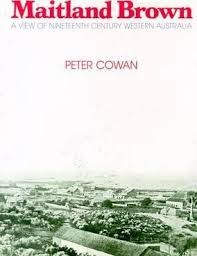Biography of Western Australian politician, explorer, magistrate, farmer and merchant, Maitland Brown, one of the first generation of European setllers born in the Swan River colony; includes discussion of the Fairbairn report on the position of Aborigines and settlers in the Upper Murchison and Gascoyne. pp. 404 illusts #0819
Maitland Brown (17 July 1843 – 8 july 1905) was an explorer, politician and pastoralist in colonial Western Australia. He is best remembered as the leader of the La Grange expedition, which searched for and recovered the bodies of three white settlers killed by Indigenous Australians, and subsequently killed a number of Indigenous people in an incident that remains controversial to this day.
Brown was a volunteer member of the Francis Thomas Gregory’s exploring expedition of 1861, which sailed to Nickol Bay, then explored first southward across the Hamersley Ranges to the Tropic of Capricorn, and later northward as far as the Oakover River. During the latter exploration the party suffered extreme danger from lack of water, and at one point Brown saved Gregory’s life by riding back to the party’s base camp and returning with a supply of water. The five-month expedition opened up large tracts of good pastoral land, but little with the potential to support agriculture.
In 1865, Maitland Brown was again part of an expedition to the north. The year before, three explorers, Frederick Panter, James Harding and William Goldwyer, had set out from Roebuck Bay to explore the area around La Grange Bay. The Panter-Harding-Goldwyer expedition had failed to return, and it was widely speculated that they had been speared by natives. When the Governmentlearned of the missing men, it organised a search expedition. Maitland Brown offered his services and was appointed leader of the expedition. The La Grange expedition left Fremantle in February 1865, and on 3 April it found the missing men dead. They had been speared and clubbed to death by natives, at least two of them in their sleep. Shortly after the discovery of the dead men, the expedition party engaged in a pitched battle with a tribe of natives. Between six and twenty natives were killed, with no injuries to the expedition party. Brown’s journal states that the party had walked into an ambush, but most latter-day historians have interpreted the event as a punitive attack on the natives by Brown’s party.
